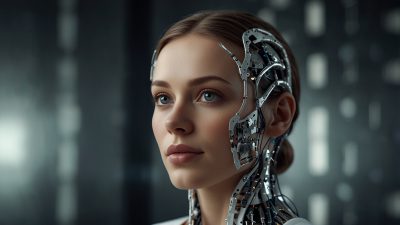Artificial Intelligence (AI) has evolved from a futuristic concept to a transformative force, shaping various aspects of our daily lives. From the devices we use to the way businesses operate, AI is becoming an integral part of the world around us. As we look to the future, the question arises: How will AI continue to influence and improve our daily routines? In this article, we’ll explore how AI is already making an impact and what we can expect in the years to come.
AI in Everyday Life
AI has infiltrated several areas of our daily lives, from smart devices in our homes to the personalized services we receive from online platforms. One of the most recognizable forms of AI in our lives is through voice assistants like Apple’s Siri, Amazon’s Alexa, and Google Assistant. These systems use natural language processing (NLP) to understand and respond to our commands, enabling us to control devices, manage schedules, and even shop online with a simple voice command.
Smart home devices powered by AI also enhance convenience and efficiency. Thermostats that adjust based on our preferences, refrigerators that track food usage, and security cameras that recognize faces or movements are just a few examples. These devices not only provide comfort but also help with energy efficiency and safety.
In the realm of entertainment, AI is transforming how we consume content. Streaming services like Netflix, Spotify, and YouTube use machine learning algorithms to recommend movies, music, and videos based on our past preferences. This personalization ensures that we spend less time searching for content and more time enjoying what’s tailored to our tastes.
AI in Healthcare
AI’s potential in healthcare is vast and still unfolding. In recent years, AI-powered tools have made significant strides in diagnostics, treatment planning, and patient care. For instance, AI algorithms can now analyze medical images, such as X-rays and MRIs, to detect early signs of diseases like cancer, often with greater accuracy than human doctors. This ability to quickly identify health issues has the potential to save lives and improve patient outcomes.
Wearable devices, like fitness trackers and smartwatches, also leverage AI to monitor our health. These devices collect data on heart rate, sleep patterns, and physical activity, then use AI to offer personalized insights and recommendations for improving health. For example, some devices can alert users if they’re at risk of a heart attack or stroke based on unusual patterns, providing early intervention opportunities.
AI in the Workplace
In the workplace, AI is automating repetitive tasks, enhancing productivity, and enabling better decision-making. In customer service, chatbots powered by AI can handle a wide range of inquiries, from simple requests to complex troubleshooting, without human intervention. This has led to more efficient customer support, faster response times, and a more streamlined experience for consumers.
AI is also revolutionizing recruitment and hiring processes. Tools that analyze resumes, track applicants, and assess job fit have made it easier for companies to find the right talent. In finance, AI-driven algorithms are used to assess risk and manage investments, while in marketing, AI can analyze consumer data to predict trends and target audiences more effectively.
The Role of AI in Transportation
One of the most exciting developments in AI is its role in transforming the transportation industry. Autonomous vehicles, which rely on AI-powered sensors, cameras, and algorithms to navigate and make decisions, are already being tested on the roads. Companies like Tesla, Waymo, and others are working to perfect self-driving technology, which could reduce traffic accidents, improve road safety, and transform how we travel.
Additionally, AI is making traffic management smarter and more efficient. Through the analysis of traffic patterns and real-time data, AI systems can optimize traffic signals, reduce congestion, and even predict potential bottlenecks. This can lead to smoother commutes and a reduction in fuel consumption, benefiting both drivers and the environment.
AI in Education
AI is reshaping the educational landscape, providing personalized learning experiences and improving access to education. Adaptive learning platforms, powered by AI, can analyze a student’s progress and tailor lessons to their individual needs, allowing them to learn at their own pace. This personalized approach is especially beneficial in large classrooms, where teachers may struggle to give each student the attention they need.
In higher education, AI can assist with administrative tasks, like grading, scheduling, and even advising students. AI-powered virtual tutors and chatbots can provide students with immediate support and guidance, making education more accessible and efficient.
Looking to the Future
As we look to the future, the potential for AI to shape our lives is boundless. With advancements in machine learning, natural language processing, and robotics, AI will continue to revolutionize industries like healthcare, transportation, education, and more. In the coming years, we can expect even more seamless integration of AI into our daily routines, making our lives more convenient, productive, and connected.
However, the rise of AI also brings challenges, including ethical concerns and the need for regulation. As AI becomes more powerful and autonomous, it will be important to ensure that it is used responsibly and for the benefit of all.
Conclusion
Artificial Intelligence is no longer a distant concept but a present-day reality that is already transforming the way we live and work. From healthcare to education, transportation to entertainment, AI’s potential to improve our daily lives is immense. As we continue to embrace and refine this technology, the future of AI looks brighter than ever, offering new opportunities for innovation, convenience, and efficiency. While there are challenges to address, the overall impact of AI on society is poised to be overwhelmingly positive, shaping a future where technology works seamlessly with our everyday lives.





